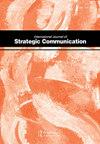伊斯兰恐怖袭击后穆斯林组织的战略传播——来自德国的定性分析
IF 1.9
Q1 COMMUNICATION
International Journal of Strategic Communication
Pub Date : 2023-11-14
DOI:10.1080/1553118x.2023.2265916
引用次数: 0
摘要
与恐怖主义相关的危机传播研究主要涉及作为行为体的政府机构和国家,但很少涉及试图影响社会对穆斯林看法的非国家行为体。本文考察了在具有伊斯兰主义背景的恐怖袭击和伊斯兰恐惧症袭击后,德国穆斯林组织的危机传播。我们分析了所有可公开获得的声明,包括新闻稿、社交媒体账户和穆斯林组织在2015年至2020年期间对袭击的回应。总共226个陈述和8个不同类别的回应被确定并使用定性内容分析进行分析。在回应伊斯兰袭击时,穆斯林组织强调了社会的一般责任,以及穆斯林本身是此类袭击的受害者,但避免承担更直接责任的方式。在回应恐伊斯兰袭击时,穆斯林组织提供了更多有关袭击的背景信息。较活跃组织的新闻稿比较不活跃组织的新闻稿更经常地刊登在报纸上。总的来说,穆斯林组织为尽量减少对其组织和穆斯林作为一个群体的声誉的损害而采用的策略在某些方面与企业采用的策略相似。需要对这些不同策略的有效性进行更多的研究。披露声明作者未报告潜在的利益冲突。该研究由德国联邦教育和研究部(BMBF #01UG2038A)支持。本文章由计算机程序翻译,如有差异,请以英文原文为准。
Strategic Communication of Muslim Organizations in the Aftermath of Islamist Terrorist Attacks – a Qualitative Analysis from Germany
ABSTRACTResearch on crisis communication related to terrorism deals mostly with governmental institutions and states as actors, but little on non-state actors attempting to influence perceptions of Muslims in society. The present article scrutinizes crisis communication of Muslim organizations in Germany after terrorist attacks with Islamist background and Islamophobic attacks. We analyzed all publicly available statements as reported in press releases, social-media accounts, and newspaper quotations from Muslim organizations in response to attacks between 2015 and 2020. In total, 226 statements and eight different categories of responses were identified and analyzed using qualitative content analysis. When responding to Islamist attacks, Muslim organizations highlighted general responsibility of the society, and the ways in which Muslims are themselves victims of such attacks but avoided taking more direct responsibility. When responding to Islamophobic attacks, Muslim organizations gave more background information on the attacks. Press releases by more active organizations were taken up more frequently in newspapers than press releases by less active organizations. Overall, the strategies that Muslim organizations utilize to minimize harm to the reputation of their organization and Muslims as a group are in some respects like those employed by enterprises. More research into the effectiveness of these different strategies is needed. Disclosure statementNo potential conflict of interest was reported by the authors.Additional informationFunding The study was supported by the German Federal Ministry for Education and Research (BMBF #01UG2038A).
求助全文
通过发布文献求助,成功后即可免费获取论文全文。
去求助
来源期刊

International Journal of Strategic Communication
Social Sciences-Sociology and Political Science
CiteScore
3.40
自引率
0.00%
发文量
39
期刊介绍:
The International Journal of Strategic Communication examines the philosophical, theoretical, and applied nature of strategic communication, which is “the purposeful use of communication by an organization to fulfill its mission.” IJSC provides a foundation for the study of strategic communication from diverse disciplines, including corporate and managerial communication, organizational communication, public relations, marketing communication, advertising, political and health communication, social marketing, international relations, public diplomacy, and other specialized communication areas. The IJSC is the singular forum for multidisciplinary inquiry of this nature.
 求助内容:
求助内容: 应助结果提醒方式:
应助结果提醒方式:


